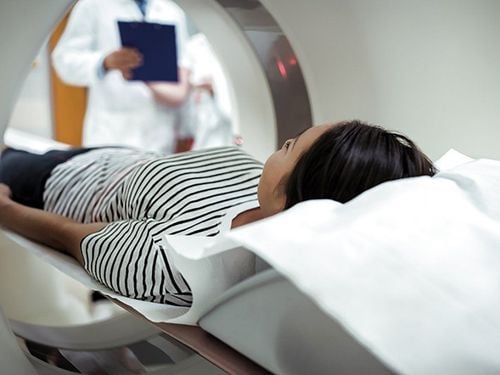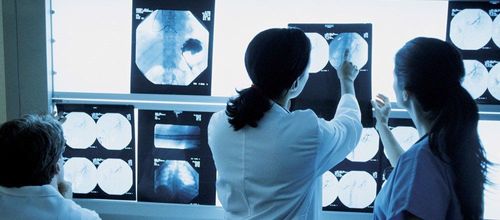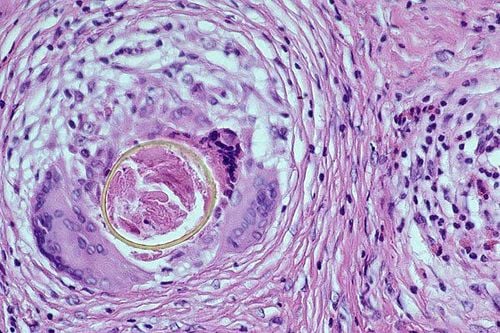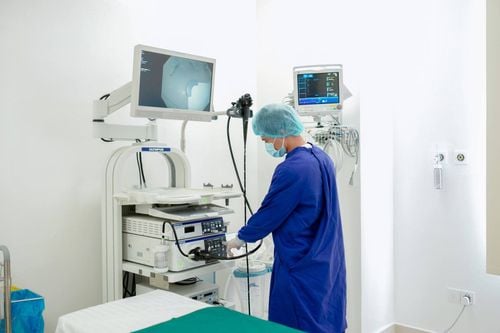This is an automatically translated article.
Posted by Master, Doctor Mai Vien Phuong - Department of Examination & Internal Medicine - Vinmec Central Park International General HospitalEarly cancer prediction and response to treatment is a key issue in individualized treatment of cancer patients. Artificial intelligence (AI), a field of computer science, aims to develop algorithms or computer programs with advanced analytical or prediction capabilities. The application of artificial intelligence to cancer early detection can improve diagnostic accuracy, improve clinical decision-making, and lead to revolutionizing the future of diagnosis and treatment.
1. What is Artificial Intelligence?
Artificial intelligence (AI) refers to the simulation of human intelligence in machines that are programmed to convert raw input data into human-like, decision-making actions. AI programs are designed for decision making, often using deep learning and computer-guided programs to analyze and process raw data to make clinical decisions for effective treatment. New techniques are needed to predict cancer at an early stage because conventional methods have poor accuracy and cannot be applied to personalized medicine. AI has the potential to use intelligent, intelligent computer systems to interpret images and diagnose cancer early. AI has been changing almost every aspect of the medical field by integrating with emerging new technologies. AI has revolutionized the entire healthcare system through innovative digital diagnostics with greater precision and accuracy. AI has the potential to detect cancer at an early stage with accurate diagnosis and improve survival outcomes. AI is an advanced technology of the future that can be used to predict, diagnose and treat cancer early.
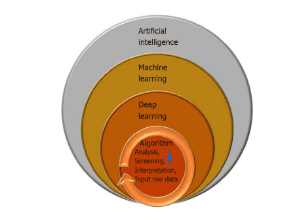
2. Advancement of AI technology leads to advancement of cancer diagnostic fields
AI innovation has the potential to influence several parameters of cancer therapy. These include prediction, screening, analysis and interpretation of huge data sets, decoding of tumor imaging data, drug discovery, and drug validation in clinical settings. Screening for tumor targets in both healthy and high-risk populations offers the opportunity to detect cancer early and improve the chances of recovery to treatment and cure. Advances in AI with machine learning and deep learning are evolving rapidly, and will soon change the science of cancer detection and screening. Training in advanced AI technologies is needed to predict cancer early in patients. Although AI applications are still limited, the potential role of AI in early cancer detection is huge to extract information about diagnosis, prognosis, and therapeutic response
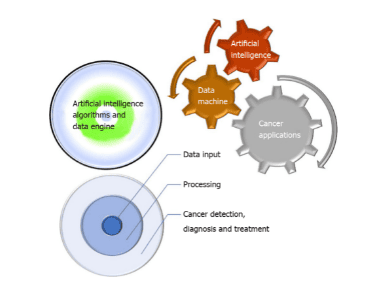
3. AI in early detection of cancer
AI precision algorithms can be used to improve precision medicine to target the right patient for the right therapy at the right time. The proliferation marker Ki-67 is highly relevant to the diagnosis, classification, prognosis and treatment of early breast cancer. Automated brain tumor segmentation methods are computational algorithms that help identify tumors and have become an important diagnostic tool in precision medicine planning.
Accurate identification and detection of lymph node metastases is important for colon cancer treatment planning. Due to the complexity and heterogeneity in cancer data, AI-based algorithms can be used to digitally identify histopathological tumor samples and analyze images. Mutation prediction and validation using raw input digitized histopathology showed promising results for six different gene mutations (STK11, EGFR, FAT1, SETBP1, KRAS and TP53) in cancer lung . Mutations in KRAS, the tumor protein P53, and the predictive accuracy of these markers can be used for early cancer diagnosis. Clinicians have used AI to establish an early signature (programmable ligand 1) that can predict the effectiveness of cancer immunotherapy.

4. AI's data analysis capabilities have come a long way in recent years to predict cancer at the starting point.
Targeted cancer screening algorithms and data processing through AI will enable increased detection and early intervention. Conventional cancer detection and treatment methods are expensive, time consuming, and often produce poor results. To address this issue, the development of machine learning techniques is central to discovering new biomarkers for early diagnosis. Early and accurate cancer diagnosis is fundamental to the clinical management of cancer. AI can accelerate drug discovery, harness biomarkers to precisely match patients to clinical trials, and truly personalize cancer therapy using only our own data. patient. These advances are signs that AI-powered practice-changing cancer therapy may be on the way.5. AI in clinical diagnosis
The development of high-precision AI algorithms for early disease recognition is crucial not only for the rapid identification and diagnosis of cancer patients, but also for treatment. AI can be useful in clinical diagnosis to ensure adequate patient care. Useful screening tools for accurate cancer diagnosis, such as mammography, radiography, and image processing, will improve the efficiency of clinical diagnosis. AI algorithms that have been developed with large data sets show improved diagnostic capabilities compared to clinicians.
AI-assisted diagnosis for cancer detection at heterogeneous and complex stages, has shown to be effective in different clinical data sets. Multiple AI platforms are being developed and approved by the U.S. Food and Drug Administration for use in several areas of oncology, such as to identify suspicious lesions in cancer and interpret images. magnetic resonance imaging or computed tomography. There are a number of AI algorithms for cancer screening, to identify flagged areas in tumors or treatment trends, and to evaluate large data sets. For example, there is an AI algorithm for visualizing lung nodules in lung cancer patients and another AI algorithm for detecting breast abnormalities.
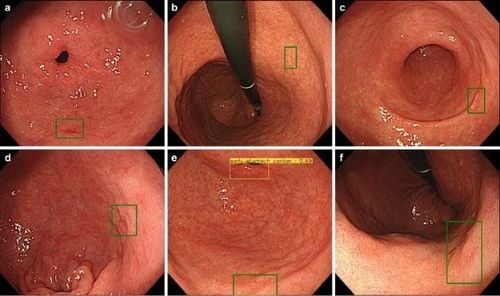
6. AI and new technology
Advanced technologies like AI are pervading the entire healthcare system and reshaping patient care. The volume of data available has grown exponentially, which can be used for early diagnosis and clinical decision-making. The revolution of AI in biomedical sciences is crucial to the development of the concept of precision medicine. Simultaneously with the growth of the field of precision medicine comes an even greater revolution in understanding cancer early detection events using digital technology. AI in oncology has focused on risk prediction with the hope of using risk information to influence health behavior and treatment outcomes. Understanding the science of early death in cancer provides the tools and insights to help translate AI information into effective treatments.
7. AI has been used in many areas of clinical medicine
A smartphone application called DiagnosUs is developed by AI technology to analyze and annotate medical images and videos based on the close relationship between cancer prediction and treatment response of patients. patient. AI can drive everything from drug development to innovative design to new, better therapies. Advanced analytics of big data with AI can make predictive modeling of biological processes transform research into development and increase accuracy for selecting the right drugs and dosages for complex diseases. For example, the Google-backed company DeepMind has built a device that can diagnose various diseases in real time. It can be used for scanning, rapid diagnosis and can detect early conditions such as diabetic retinopathy, age-related degeneration and cancer. Similarly, the Big Data to Knowledge initiative is launched by the National Institutes of Health to support research and development of tools to integrate big data and data science into biomedical research. AI-guided clinical care has the potential to play an important role in cancer screening, diagnosis, and treatment. Integrating AI technology into cancer care can further improve diagnostic accuracy and speed for better health outcomes. The scientists trained computer algorithms to analyze patient images of prostate, breast and brain tumours. It can be used in clinics as a tool to help diagnose, make clinical decisions, and predict patient outcomes. AI can predict commonly mutated genes, identify biomarkers, interpret complex images, and diagnose solutions for challenging cancers Conclusion AI has improved diagnostic outcomes diagnosis and treatment in cancer patients. AI can recognize patterns that clinicians can easily miss. Cancer is a dangerous disease with low survival rate, long process and very expensive treatment. Furthermore, the lack of publicly available large datasets, interpretation concerns, lack of well-annotated databases, reproducibility and validation issues have been significant barriers. for AI practice and algorithm development. There is a need to establish a central platform for sharing standardized cancer data sets to drive AI innovation. In the near future, AI can be integrated into a multitude of innovative emerging mobile health interfaces, such as digital technologies, smartphone apps and wearable devices, to develop health care products. A real-time tracker for digital biomarkers that can interpret, influence, and predict clinical outcomes.
Please dial HOTLINE for more information or register for an appointment HERE. Download MyVinmec app to make appointments faster and to manage your bookings easily.






